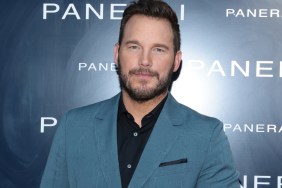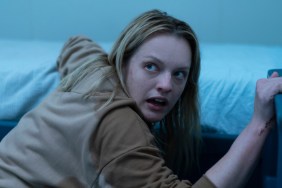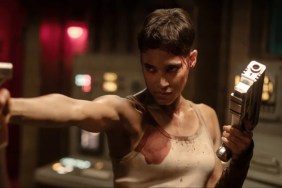Her first return to horror since Donnie Darko

Last week, ShockTillYouDrop.com had a chance to talk to three of the stars of DreamWorks’ new horror flick The Ruins, directed by Carter Smith from a screenplay by Scott Smith (A Simple Plan) adapted from his own novel about a group of friends in Mexico for vacation who come upon the ruins of an ancient Mayan temple and find themselves fighting for their lives as they awaken something deadly that puts their survival instincts and endurance to the ultimate test.
Below you can read our interview with Jena Malone, whose earlier foray into genre films includes Richard Kelly’s debut Donnie Darko, but who has done a variety of strong indie and awards-worthy fare in the years since then, and you can also read our interview with Shawn Ashmore here. (Our interview with Laura Ramsey will be posted later in the week.)
One thing you need to know about Jena Malone before reading this interview is that she’s a force of nature. You don’t interview her as much as you say something and then watch where things go, but it’s always fun talking to her, because she’s incredibly smart and outspoken and into really cool stuff, as you’ll find out when we asked why she decided to do her first real horror movie. Put it this way. Of the three actors we talked to for the film, Malone wins extra points for name-checking the likes of Cronenberg and Lynch, plus she’s been rocking out in recent years with her band, which is called (I’m not making this up) “Jena Malone and her Bloodstains”, so yeah, she’s definitely ShockTillYouDrop material!
ShockTillYouDrop.com: I have to start by telling you that I haven’t seen the movie or read the book, just to let you know now.
Jena Malone: That’s okay. There’s many of you out there.
Shock: I guess so, but the first question I feel the need to ask is why you decided to do a movie like this at this point in your career? I’ve been following your career for some time with some of the indie movies like “Donnie Darko” and “The Dangerous Lives of Altar Boys” but this is a very different film being straight genre.
Malone: Well, for me, it always starts with the material, and it was a really interesting script. There was very little dialogue. It was very humanistic and naturalistic and very creepy and f*cked up and suspenseful and talking about really abstract things about human nature in a very subtle and interesting way. I was completely drawn in and I did some research and found out the director was a first-timer, so I asked to see some of his work. He had done this short film called “Bugcrush” which they had sent me, and I didn’t know anything about it. I was literally bending down in front of my television and I put it into my DVD player and it started playing. I’m totally like the type of person that yells at my little sister to move away from the television. “You’re too close! You’re playing video games too close! Come sit on the couch!” But as soon as I put it in the DVD player and it started, I sat there right in front of the television and watched it. It’s like 20 minutes, and it was probably the creepiest thing I had seen in a really long time. I’m saying “creepy” in the same vein as⦠for me, my favorite horror films, like when I want to see something that’s going to creep me out and make my skin crawl and make my mind bend, I wanna watch Cronenberg. I wanna watch a Lynch film. Those, for me, are like the masters of the horror genre f*ck, and I feel like Carter Smith was making films like that. For me, David Lynch, he doesn’t make films anymore. He’s making this creepy crawly organisms that he implants underneath your skin, and you can smell them and taste them and feel them moving inside of you, and I felt like Carter had a very similar approach to what he was doing psychologically, physically and emotionally in his film. And I said, “I want to do it” and they said they wanted me, so I was down to try something new out.
Shock: Very cool. That’s probably the highest compliment in my book, comparing anyone to Cronenberg or Lynch. So I’m guessing you’re a fan of the horror genre or those kinds of movies.
Malone: Well, in the sense of it. I’m not like a fan of the whole female mutilation, cut âem up and sell for $60,000, but I am a fan of films that get underneath your skin and make you feel a little uncomfortable. Whether it’s using it on a chemical level or a horror level or an emotional level, really interesting, but this film is more like “Rosemary’s Baby” meets like “Lord of the Flies” a little. I feel like it’s more psychological, it’s about the people, about the edge of the seat, about the brutality of humans facing survival in extreme ways, and that’s what’s really interesting for me. It’s not like I’m going to be running around in my underwear being chased by a guy in a chainsaw. That’s not very interesting to me. I feel like I’ve seen that 60 thousand million times before.

Shock: Scott Smith wrote the book and the screenplay himself, so did you try to read one or the other first before you came onto this?
Malone: I read the script first without having read the book. I’d heard of the book but hadn’t read it. Actually, I’d read “A Simple Plan” so I was familiar with his work, and actually, I think I read the book on the plane ride over before the audition or something. I wanted to see what it was like.
Shock: What was your impression of the differences between the two? The characters go through different situations and experiences in the film apparently, so what did you think about how your character was portrayed?
Malone: Like always, I mean listen, it’s like the difference between a novel and a film, I mean it’s huge, it’s like a painting and a postage stamp sometimes. You have to shrink it down to the minutest detail from this wide large brush stroked canvas that things get lost in the translation, but I feel like both were solid entities into their own right. That’s the trickiest thing, making an adaptation that can speak for itself without having to refererences of the book, and I feel like that was achieved. We were also f*cking lucky to have the novelist adapt the screenplay, so he totally knew what he wanted to keep and what he didn’t. I think he’s also a very cinematic thinker in the sense of what he wants to show and what he holds. His novels are very cinematic in that sense.
Shock: Did you get to talk to him about your character at all, either before shooting or in rehearsals?
Malone: I never did. We were all the way in Australia, so I think he stayed in hometown.
Shock: I’m surprised. He didn’t go there at all?
Malone: No, I don’t think he ever came out. I think he was busy, but I don’t know. I don’t think it’s a bad thing.
Shock: What are the main differences between your character and Laura Ramsey’s? I know you’re best friends in the movie and you’re both put through this experience, but how does your character react to this situation different than her?
Malone: Laura’s character Stacey is a little bit more free. She’s much more the free spirit and easier to know, easier to laugh at the beginning, and I’m a little bit more controlling. I don’t want to do a lot of things. A lot of people interpret my character in the novel and in the script as kind of whiney and bitchy. She’s smart and she wants to ask questions and she likes to be involved, but what’s interesting is throwing these two characters into the midst of completely stripping them down from all those things that feel safe. I am who I am because of the car I drive. I am who I am because of the jokes I make, but you strip all of that down, and you’re basically thinking about food and water and your life. New things come out of you, and I think what differentiates my character from Stacey is there’s a full circle there between this whiny, privileged woman that’s never really thought about having to take care of others. She’s faced with her best friend needing her 100% and she finds the maturity to be there and nurture and grow and try to take care. Stacey almost loses her mind and that’s a really hard to watch your best friend go through, but I think Amy really steps up to the challenge of trying to help that and maintain that.
Shock: What was the experience like for you in terms of being in Australia, just the five of you in this location.
Malone: Oh, it was beautiful, it was fun, but the thing is that it was three and a half months of torturing myself every day, and maintaining heightened states of unsustainable states, of hyperventilation and overexhaustion and heat depravation and starvation, and we’re dealing with a lot of different forms of deprivation, so it was a really tough shoot.

Shock: I can imagine, but was the experience one that you’d ever want to do again or do you need a break from the horror genre before doing more of it?
Malone: Yeah, I’m not ready to go back into the jungle yet, but I think come the right circumstances, I might be able to lace up my shoes. I’d like to get out of being covered in blood maybe.
Shock: What else have you been working on since finishing this movie?
Malone: We finished in about July and I got back in August. You know, I haven’t really. It took me a while to shake this film off. There were other films happening but I wasn’t ready, and then the strike happened, and there was nothing interesting. I’ve just been doing other things, making music has taken complete control of my life, so I’ve been trying to volley between the two, and being like, “No, no, Jenna, you have to go back and continue playing in the other field!” because one field just felt so nurturing. There’s a few things I’m looking at. There’s a film coming out called “The Go-Getter”, which actually went to Sundance a year ago. It’s been swimming in the independent ether and it’s found its home and it’s coming out June 6th, so that’s really exciting. I love that film.
Shock: As far as doing music, you’ve been finding that more nurturing than the movie business?
Malone: Well, it’s just like becoming a child again. I’ve been acting since I was 10 years old, and now I’m learning a completely new vocabulary and I don’t know all of the word placement, so I just sort of stare in awe with my mouth open and trying to read a new language by my heart. I find that you don’t have as many restrictions or shackles when you enter into a new creative field, as any artist should do, is continually push themselves and see where else they can go and stretch the imagination of who they are and who I am as a woman and who I am as an artist. That’s the really exciting part.
Shock: Have you enjoyed touring and playing in different places or do you prefer studio recording?
Malone: Yeah! Every part. I’ve sort of stepped in and fulfilled every hat, whether it be the roadie or the engineer, I’ve just been trying to do as much myself as I can, and it’s extremely beautiful and I’m really thankful that I have this separate little thing in my life that I can go back to if Hollywood gets bored of me.
We truly doubt that might ever happen, but you can catch Jenna in The Ruins when it opens on Friday, April 4.



Source: Edward Douglas









